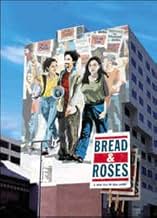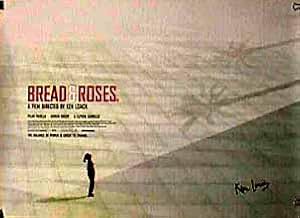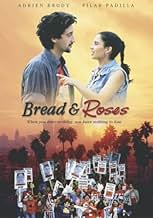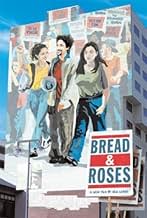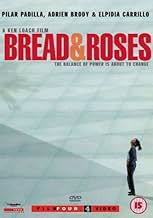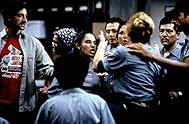CALIFICACIÓN DE IMDb
7.0/10
6.3 k
TU CALIFICACIÓN
Dos hermanas latinas trabajan como limpiadoras en un edificio de oficinas y luchan por el derecho a sindicalizarse.Dos hermanas latinas trabajan como limpiadoras en un edificio de oficinas y luchan por el derecho a sindicalizarse.Dos hermanas latinas trabajan como limpiadoras en un edificio de oficinas y luchan por el derecho a sindicalizarse.
- Dirección
- Guionista
- Elenco
- Premios
- 5 premios ganados y 10 nominaciones en total
Frankie Davila
- Luis
- (as Frank Davila)
Eloy Méndez
- Juan
- (as Eloy Mendez)
- Dirección
- Guionista
- Todo el elenco y el equipo
- Producción, taquilla y más en IMDbPro
Opiniones destacadas
10co_iww
"Bread and Roses" is an engaging film about immigrant workers' struggles against poverty, state violence, and economic exploitation. I saw "Bread and Roses" at the Denver Film Festival thinking it was going to be a dry, lecturing documentary. Instead, it was a nuanced and complex dramatic depiction of powerful and engaging characters. It is rare to find such a politically charged film that is made so effective by presenting very human characters struggling with the contradictions of everyday life. It allows us to appreciate the tough choices we all make in conditions not of our own choosing--it allows us to explore issues outside of the knee-jerk judgments of good guy/bad guy and appreciate the very human responses to often inhuman circumstances we all participate in creating. The acting is generally very good, especially for a "low budget" production, but the main character's older sister delivers a monologue on her struggles with deprivation that still chills me to the bone even though I saw it months ago. Sorry for leaving out the details, but this is one film whose details you'll want to discover for yourself.
When I attended a screening a week ago sponsored by a local public supported radio station (KPFK) in Los Angeles, I was not certain if this film was a documentary or typical crafted Hollywood-style hyperbole since I listened with half an ear while jogging and listening to an opportunity to attend.
Who would have thought that a simple discussion on a local public supported radio station in Los Angeles (KPFK) a few years ago would compel a screenwriter (Paul Laverty) to visit a union organizing effort in downtown Los Angeles (circa 1999) resulting in a film that was drama, comedy, farce, fear, compassion and a taste of dusted immigrants creeping through Tijuana-to-USA shrubs to gain entry via the abusive "coyotes" human smuggler routes. Most of these immigrants land in day-worker situations and low pay and yet Los Angeles would collapse without them. This film concentrates on the downtown office area -- owned and occupied by the elite of Los Angeles establishment - and where many undocumented workers toil under conditions that are far less than that suggested by international Human Rights standards.
This was a polished non-Hollywood-capability-film but yet intimately Los Angeles. I listened to an interview yesterday on KPFK with Laverty and learned that funding was elsewhere - Europe I recall - not 'Hollywood'. And Laverty is from Scotland. One would never guess that the film was actually on the low-budget scale when compared with Hollywood's pleasure to spend big dollars.
I also learned that the film was made in 30-days (hence the vibrant interaction of all cast members and energetic direction by Loach) and is in release this week with 30 prints in Los Angeles, and 300 nationwide USA. Sounds like some symmetry there and potential Lottery pick permutations.
My only reservation is that the story is highly political in an undercurrent nature and may frighten an extensive audience --- unless the viewers just take the courage to go, watch, and enjoy. The film will do the rest. The viewer will leave with more than the cost of a matinee price ticket.
I also suggest that in an upcoming meeting between Vicente Fox, President of Mexico, and George W. Bush, President of United States, that Vicente snag a copy of the film and show it to George while sipping tea in Texas. And then for dessert, sip more tea and watch "Traffic".
Who would have thought that a simple discussion on a local public supported radio station in Los Angeles (KPFK) a few years ago would compel a screenwriter (Paul Laverty) to visit a union organizing effort in downtown Los Angeles (circa 1999) resulting in a film that was drama, comedy, farce, fear, compassion and a taste of dusted immigrants creeping through Tijuana-to-USA shrubs to gain entry via the abusive "coyotes" human smuggler routes. Most of these immigrants land in day-worker situations and low pay and yet Los Angeles would collapse without them. This film concentrates on the downtown office area -- owned and occupied by the elite of Los Angeles establishment - and where many undocumented workers toil under conditions that are far less than that suggested by international Human Rights standards.
This was a polished non-Hollywood-capability-film but yet intimately Los Angeles. I listened to an interview yesterday on KPFK with Laverty and learned that funding was elsewhere - Europe I recall - not 'Hollywood'. And Laverty is from Scotland. One would never guess that the film was actually on the low-budget scale when compared with Hollywood's pleasure to spend big dollars.
I also learned that the film was made in 30-days (hence the vibrant interaction of all cast members and energetic direction by Loach) and is in release this week with 30 prints in Los Angeles, and 300 nationwide USA. Sounds like some symmetry there and potential Lottery pick permutations.
My only reservation is that the story is highly political in an undercurrent nature and may frighten an extensive audience --- unless the viewers just take the courage to go, watch, and enjoy. The film will do the rest. The viewer will leave with more than the cost of a matinee price ticket.
I also suggest that in an upcoming meeting between Vicente Fox, President of Mexico, and George W. Bush, President of United States, that Vicente snag a copy of the film and show it to George while sipping tea in Texas. And then for dessert, sip more tea and watch "Traffic".
I have a deep sympathy & connection with this movie, because two of my dearest friends were Spanish-speaking cleaners in the UK (although completely legally). Now - through ridiculously hard work and frugal living - they are bilingual, educated, skilled, and making a decent life back in their home country, where I hope to visit them one day.
As such, I can tell you that this film is so true-to-life it brought tears to my eyes. It also has moments of laughter and comedy, and an extremely important message to anyone working for low wages and low respect, and an equally important kick up the backside to people like me who never think we're paid enough, and forget about the 'invisible' people earning half our wages for doing twice the workload.
The actors (many of them cleaners in real life) are never less than excellent, and you have no trouble believing every scene. I encourage anyone to watch this movie, as it has an almost Shawshank-like feelgood factor, but is much more poignant and relevant than even that great film.
The additional programme on the DVD is not as informative as I expected (being more 'fly-on-the-wall' than documentary), but still packs a powerful emotional punch, and really adds to your appreciation of the reality behind the movie.
As such, I can tell you that this film is so true-to-life it brought tears to my eyes. It also has moments of laughter and comedy, and an extremely important message to anyone working for low wages and low respect, and an equally important kick up the backside to people like me who never think we're paid enough, and forget about the 'invisible' people earning half our wages for doing twice the workload.
The actors (many of them cleaners in real life) are never less than excellent, and you have no trouble believing every scene. I encourage anyone to watch this movie, as it has an almost Shawshank-like feelgood factor, but is much more poignant and relevant than even that great film.
The additional programme on the DVD is not as informative as I expected (being more 'fly-on-the-wall' than documentary), but still packs a powerful emotional punch, and really adds to your appreciation of the reality behind the movie.
In this movie, there are no purloined designer clothes to masquerade in, and Prince Charming doesn't come complete with a political career and a three-piece suit--he's a scruffy charmer in a baggy t-shirt with little more to offer than a megaphone and a cause.
This is a film made by a director who has to be spiritual kin to Michael Moore, but his subject matter is quite different. Here we see real immigrants (both legal and illegal) being used rather cynically by companies whose business plan includes hiring the most downtrodden and fearful and hand-to-mouth in our country, paying them the lowest possible wages, giving them absolutely no benefits whatsoever, and thereby winning contracts to provide custodial and other services over companies that pay a fair and living wage, plus benefits, to primarily unionized employees who are American citizens. You know this really happens. It does. The best remedy for the situation is certainly a matter for debate, but no matter what your political slant or position on labor unions and illegal immigrants, you will most definitely find food for thought herein.
OTOH, if you are also one of the drooling legions of newbie Adrien Brody fangirls, you will find even more food for thought. Brody is painfully cute in this movie-a piquant mixuture of earnest, funny, sincere, sweet, and fiery, topped off with a kinghell case of `bedhead'.
The three central players are Pilar Padilla, as idealistic illegal immigrant Maya, her overburdened sister Rosa, played by Elipidia Carillo, and Brody as Sam Shapiro, an organizer and activist for the cause. No fairy tale, this movie, though a few of the cast are reasonably good-looking. The cast, many of whom really are janitors and custodians, are as real as it gets. You can see a lifetime of hard labor and long hours in their faces, and the slump to their shoulders.
I really grew to like these struggling janitors and maids. None of them were "types"--they were all real people and their conflicts and concerns were illuminated very well, despite limited screen time being available to each. By treating these characters with respect and making them fully-fleshed out, it made the passion of the organizers for this particular cause more understandable, and not just as sometimes seems the case in some portrayals, a matter of someone who is bored or spoiled or has some sort of guilt-complex trying to find their identity and using do-gooderism as a means to that end. Through coming out from the shadows, and joining the great and messy American experience of organized dissent, you could practically see some of these characters changing into `Americans' before your eyes, no matter what their official papers might say. Thinking like Americans, standing up for their rights, making their voices heard. That's how it's supposed to work-isn't it? Isn't it?
If there are caricatures in this movie, then those would be some of the building administrators, but their screen time is so limited, and they are usually so surprised and besieged by Sam Shapiro's stunts and protests that their lack of articulate or sympathetic response seems realistic enough to me. But the one thing that stands out is more than anything else is the absolutely natural acting style. Nobody really seems to be "acting" in this movie. It's as if there was a very unobtrusive documentary maker following these folks around. The movie is, however, well-paced between scenes which are rousing or charming, and those which are raw and painful.
Although this movie is not a love story or romance, per se, Adrien's character does get some action in it. In fact, in one amusing scene, he is literally hauled into a janitor's closet by an enterprising female (smart girl!!) and snogged silly. One can but applaud that sort of enterprise and initiative on the part of a recent arrival to this great country of ours. That's the kind of can-do immigrant spirit that made this country great, and if I were there, I would be sure to tell her how much I admired that quality in her, when I visited her in the hospital to apologize for having accidentally whacked her out of the way with a long-handled mop.
But it can't all be funny and cute, and indeed, in this same section of the movie is a scene of such raw emotion, harsh language, honesty, and truth, between the two Mexican sisters that I cannot say I have ever seen anything like it. Even Ebert said in his review that it's the kind of scene that would win an Oscar if the Academy ever saw movies like this, which of course, they don't.
The ending is both feel-good triumphant, and bittersweet. I think that such an ending was very much in keeping with the tone and overall realism of this movie--yes, some things changed for the better, but for people like these, not everyone gets that happy ending and lives happily ever after. At least, not right away.
There's real passion here, on the part of everyone involved, and it feels genuine, not manipulative. It's a pleasure to see a movie with good quality production values and excellent acting which was made for a reason, not just to make money.
This is a film made by a director who has to be spiritual kin to Michael Moore, but his subject matter is quite different. Here we see real immigrants (both legal and illegal) being used rather cynically by companies whose business plan includes hiring the most downtrodden and fearful and hand-to-mouth in our country, paying them the lowest possible wages, giving them absolutely no benefits whatsoever, and thereby winning contracts to provide custodial and other services over companies that pay a fair and living wage, plus benefits, to primarily unionized employees who are American citizens. You know this really happens. It does. The best remedy for the situation is certainly a matter for debate, but no matter what your political slant or position on labor unions and illegal immigrants, you will most definitely find food for thought herein.
OTOH, if you are also one of the drooling legions of newbie Adrien Brody fangirls, you will find even more food for thought. Brody is painfully cute in this movie-a piquant mixuture of earnest, funny, sincere, sweet, and fiery, topped off with a kinghell case of `bedhead'.
The three central players are Pilar Padilla, as idealistic illegal immigrant Maya, her overburdened sister Rosa, played by Elipidia Carillo, and Brody as Sam Shapiro, an organizer and activist for the cause. No fairy tale, this movie, though a few of the cast are reasonably good-looking. The cast, many of whom really are janitors and custodians, are as real as it gets. You can see a lifetime of hard labor and long hours in their faces, and the slump to their shoulders.
I really grew to like these struggling janitors and maids. None of them were "types"--they were all real people and their conflicts and concerns were illuminated very well, despite limited screen time being available to each. By treating these characters with respect and making them fully-fleshed out, it made the passion of the organizers for this particular cause more understandable, and not just as sometimes seems the case in some portrayals, a matter of someone who is bored or spoiled or has some sort of guilt-complex trying to find their identity and using do-gooderism as a means to that end. Through coming out from the shadows, and joining the great and messy American experience of organized dissent, you could practically see some of these characters changing into `Americans' before your eyes, no matter what their official papers might say. Thinking like Americans, standing up for their rights, making their voices heard. That's how it's supposed to work-isn't it? Isn't it?
If there are caricatures in this movie, then those would be some of the building administrators, but their screen time is so limited, and they are usually so surprised and besieged by Sam Shapiro's stunts and protests that their lack of articulate or sympathetic response seems realistic enough to me. But the one thing that stands out is more than anything else is the absolutely natural acting style. Nobody really seems to be "acting" in this movie. It's as if there was a very unobtrusive documentary maker following these folks around. The movie is, however, well-paced between scenes which are rousing or charming, and those which are raw and painful.
Although this movie is not a love story or romance, per se, Adrien's character does get some action in it. In fact, in one amusing scene, he is literally hauled into a janitor's closet by an enterprising female (smart girl!!) and snogged silly. One can but applaud that sort of enterprise and initiative on the part of a recent arrival to this great country of ours. That's the kind of can-do immigrant spirit that made this country great, and if I were there, I would be sure to tell her how much I admired that quality in her, when I visited her in the hospital to apologize for having accidentally whacked her out of the way with a long-handled mop.
But it can't all be funny and cute, and indeed, in this same section of the movie is a scene of such raw emotion, harsh language, honesty, and truth, between the two Mexican sisters that I cannot say I have ever seen anything like it. Even Ebert said in his review that it's the kind of scene that would win an Oscar if the Academy ever saw movies like this, which of course, they don't.
The ending is both feel-good triumphant, and bittersweet. I think that such an ending was very much in keeping with the tone and overall realism of this movie--yes, some things changed for the better, but for people like these, not everyone gets that happy ending and lives happily ever after. At least, not right away.
There's real passion here, on the part of everyone involved, and it feels genuine, not manipulative. It's a pleasure to see a movie with good quality production values and excellent acting which was made for a reason, not just to make money.
Same typical themes handled in Loach's work. I felt something strange, while watching it, maybe the San Diegan locations might be strange to the fans used to seeing English and Scottish cities. Nevertheless I couldn't say the effort of observation and insight doesn't work; the young Mexican gal propelled by the American dream is very believable, the unknown cast acts with passion, expressing the various faces of injustice and biases migrants must endure. However, my final opinion on the movie is that it fails to illustrate the real situations these kind of people live in and their genuine feelings, that is the Ken Loach's peculiarity.
¿Sabías que…?
- TriviaPrior to filming, Adrien Brody did undercover research as a union member in Los Angeles. He went to conventions and sat in on strike talks. A couple of the members recognized him, but Brody persuaded them not to blow his cover.
Selecciones populares
Inicia sesión para calificar y agrega a la lista de videos para obtener recomendaciones personalizadas
- How long is Bread and Roses?Con tecnología de Alexa
Detalles
- Fecha de lanzamiento
- Países de origen
- Sitio oficial
- Idiomas
- También se conoce como
- Bread and Roses
- Locaciones de filmación
- Productoras
- Ver más créditos de la compañía en IMDbPro
Taquilla
- Total en EE. UU. y Canadá
- USD 533,479
- Fin de semana de estreno en EE. UU. y Canadá
- USD 49,662
- 13 may 2001
- Total a nivel mundial
- USD 706,876
- Tiempo de ejecución
- 1h 50min(110 min)
- Color
- Mezcla de sonido
- Relación de aspecto
- 1.85 : 1
Contribuir a esta página
Sugiere una edición o agrega el contenido que falta



